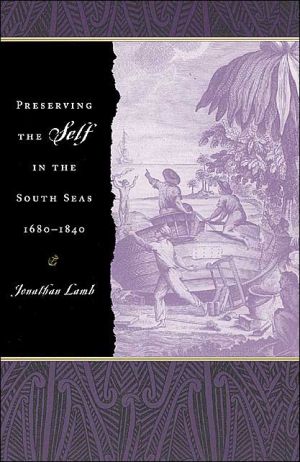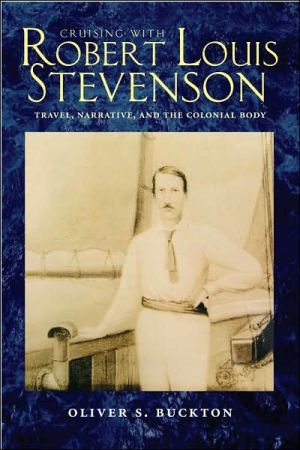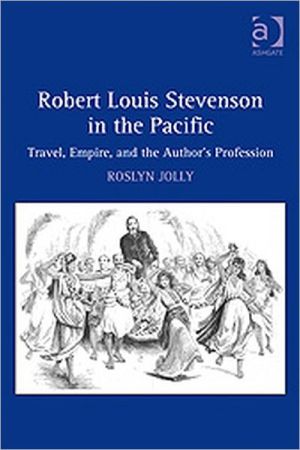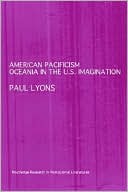Preserving the Self in the South Seas, 1680-1840
The violence, wonder, and nostalgia of voyaging are nowhere more vivid than in the literature of South Seas exploration. Preserving the Self in the South Seas charts the sensibilities of the lonely figures that encountered the new and exotic in terra incognita. Jonathan Lamb introduces us to the writings of South Seas explorers, and finds in them unexpected and poignant tales of selves alarmed and transformed.\ Lamb contends that European exploration of the South Seas was less confident and...
Search in google:
The violence, wonder, and nostalgia of voyaging are nowhere more vivid than in the literature of South Seas exploration. Preserving the Self in the South Seas charts the sensibilities of the lonely figures that encountered the new and exotic in terra incognita. Jonathan Lamb introduces us to the writings of South Seas explorers, and finds in them unexpected and poignant tales of selves alarmed and transformed.Lamb contends that European exploration of the South Seas was less confident and mindful than we have assumed. It was, instead, conducted in moods of distraction and infatuation that were hard to make sense of and difficult to narrate, and it prompted reactions among indigenous peoples that were equally passionate and irregular. Preserving the Self in the South Seas also examines these common crises of exploration in the context of a metropolitan audience that eagerly consumed narratives of the Pacific while doubting their truth. Lamb considers why these halting and incredible journals were so popular with the reading public, and suggests that they dramatized anxieties and bafflements rankling at the heart of commercial society.
Preserving the Self in the South Seas, 1680-1840\ \ By Jonathan Lamb \ University of Chicago Press\ Copyright © 2001 Jonathan Lamb\ All right reserved.\ ISBN: 0226468496 \ \ \ Political Theories of the Self \ \ \ In my dear self I centre everything;\ \ My servants, friends, my mistress, and my King;\ \ Nay, heaven and earth to that one point I bring.\ \ \ \ --John Wilmot, earl of Rochester, A Very Heroical Epistle\ \ \ The circumstances of British history that made it necessary to invent the fiction of an original contract--a founding agreement between the individual in a state of nature on the one hand and the embodiment of civil society on the other, aimed at preserving the self within a system of law --had already loosened the "self " from the protocols guaranteeing it an unreflecting, nonassertive place in political life, and forced it to consider itself in some degree of isolation from social structures. Immemorial custom, aristocratic virtue, honor, obligation, and all the other bonds of an encompassed social existence, had been damaged in the Civil War, travestied during the Restoration, and sidelined by the rights confirmed by the Glorious Revolution (Cascardi 1992, 208; Elias 1982, 64; Giddens 1991, 74). To political thinkers for whom the state of nature and the original contract were "true" fictions, they restored some sense of control after a period ofcivil strife that had divided individuals from inherited bonds of allegiance and forced them to reflect upon themselves as single beings. But the emphasis laid by these foundational myths upon self-preservation as the motive and sole purpose of association indicated a threat as well as a constitutive benefit. When Daniel Defoe wrote "Selfpreservation is the only Law / That does involuntary Duty draw" (Defoe 1860, 18), he meant a peremptory instinct independent of social obligation, to which all subsequent laws and duties acted as supplements, not restraints. Like John Locke, he understood the original contract to be an agreement with no other end than that of self-preservation, and terminable as soon as it ceased to answer it. Yet unlike the moral sense philosophers, who construed self-preservation as a common expression of natural affection, an inclination sociable from the very start, he refused to conceive of the self as coming into its own, endowed with what belongs to it by natural right. The self has to act on its own behalf and to adopt a defensive posture toward the world, accumulating the means of its subsistence until a treaty might be struck. This guarded maneuvering toward a contract is the theme (although, oddly, not the outcome) of many of Defoe's novels. In this chapter, I want to consider what kind of boundary divides the active, single self from the social self on whose behalf it is mobilized. \ \ According to Defoe's line of thought, the threat to the preservation of the self does not cease with the contract. The inroads of sovereign power, factional hatred, religious intolerance, commercial greed, and enthusiasm were all proposed by advocates of this philosophy as dangers to the self 's integrity. The instinctive duty of self-preservation, they maintained, is not peculiar to a state of nature, but constantly attends a self aware of the boundary of its own interests and the limits of its agency. From beyond and from within the self, the power of self-preservation is depleted: on the one side by a social framework in which inequality is confirmed by law, and on the other by passions incident to an embattled egoism, aggravated by an intuition of personal identity that awkwardly straddles the sense of the self as both a natural entity and a creature of convention. The blurred distinction between nature and culture raises the possibility of two selves--one prior and the other posterior; one wishing and the other fulfilling the preservation of self. This raises in turn the specter of something less than self that participates in its claim to natural integrity, and of something less than social that enters into the civic personality. \ \ As part of this paradox of self-constitution, a number of duties fall to the self that it has no hope of successfully discharging. These chiefly concern the explanation of how events unfold. Previously within the sphere of Providence, but now within the spheres of ethics and politics, narratives of self and state--biography and history--are required by the terms of the contract to reveal how its parties were fulfilling their mutual obligations and acting in the long-term interests of each other. But such accounts are notoriously difficult to compile. Histories of the interregnum, of the Glorious Revolution and of the reign of Anne, follow party lines. Romance was openly rejected and covertly adapted as a model of autobiography. Unsteady narratives of public and private life are involved at the same time in the puzzling phenomenon of opinion in its various chimerical forms, none of them susceptible to political arithmetic or cogent analysis. Bernard Mandeville yielded to the inevitable by outlining "the Necessity there is for a certain Portion of Ignorance in a well ordered Society" (Mandeville 1924, 1 : 322). Henry Fielding drew the scholium: "Means are always in our power; ends are very seldom so" (Fielding 1996a, 84). If the self cannot connect its actions to a future outcome, or demonstrate that its present circumstances are the fruit of prior purposes, it will be baffled both ethically and historically. It can neither predict nor record a sequence, and therefore remains blind to the true relation between private and public affairs (Smith 1976, 1 : 25; Pocock 1975, 466). Mandeville provides the broadest overview of this confusion when he sees civil society compounding its limitations with further limitations, and mending "by Inconstancy / Faults, which no Prudence could foresee" (Mandeville 1924: 1 : 25). Henry St. John, viscount Bolingbroke, gave the poignant close-up, "We are born too late to see the beginning, and we die too soon to see the end of many things" (Bolingbroke 1752a, 35). The best the self can do under these circumstances of a necessary ignorance is to offer vouchers of good intention, signs of civility in the absence of proofs, or simply to concentrate on self-preservation. Politeness, taste, sympathy, and the moral sense are the alleged attributes of a continuous and sociable personal identity, bent on the joint accomplishment of individual and social standards of good. Societies for the reformation of manners stood ready to coerce less disciplined citizens into paths of sociability. But unsentimental estimates of human nature state the limits of such projects by recurring to the original motive for community: "There is nothing more sincere in any Creature than his Will, Wishes and Endeavours to preserve himself . . . which either compel him to crave what he thinks will sustain or please him, or command him to avoid what he imagines might displease, hurt, or destroy him" (Mandeville 1924, 1 : 200). The multitude of polemics against luxury point out how thinly the coating of sociability was put on. \ \ Indices of the uncertainty of the bond between the self and society were widespread. Apart from the work of political philosophers, who sought to minimize the instability of the self 's relation to eligible goals, it was a mystery in physiology (never mind ethics) how an impulse of the mind or nerves passed into an action. Similarly in psychology, a force like gravity was understood to cause the association of simple ideas into complex ones, but the means by which two ideas were originally associated was (like the original contract) inconceivable as a fact. Theorists of language, borrowing directly from the contractual model, relied on convention alone as a guarantee of meaning between interlocutors, for want of a surer method of authorizing the definitions of words. At all levels of human activity, an opaque medium divided the private motive from its public outcome, leaving the profession or pretense of good intention to do the work of visible and indisputable proof. The fear of pretense and deception looming large in the culture of a people who were inventing new names for lies ("bite," "sham," and "bubble") and whose former rulers were now styled Pretenders ( James III and his son, Charles Edward Stuart), made national as well as personal identity a tormenting theme for reflection and debate. That this should be the fruit of a contract, in civil life intended as the most binding security for the advantage of the two parties, is typical of the paradoxes generated from efforts to preserve the self. \ \ Corresponding to the inner and outer dimensions of these paradoxes are two principal areas of human activity on which the issue of self-preservation is played out. The first is pleasure, and the second is voyaging. Francis Hutcheson said, "It is of the greatest importance not to trifle in the experience and identification of the most lasting lasting pleasures" (Hutcheson 1725, [iii]). Wanting a means of rational analysis and clear demonstration, and aware that consensual judgments such as opinion, sentiment, and taste--immediate registers of what pleases or disgusts-- are the chief determinants of value, political philosophers somewhat reluctantly acknowledged the importance of propensities, as opposed to principles, in the pursuit of social goals. According to Adam Smith, social institutions are not the result of wisdom, but "the necessary, though very slow and gradual consequence of a certain propensity in human nature which has in view no such extensive utility" (Smith 1976, 1 : 25). However, Lord Shaftesbury and Hutcheson led a school of thought that carefully distinguished between "a poor selfish Pleasure" that offers "no rule of good" and those feelings that are directly productive of social harmony (Hutcheson 1971, 387 [149]; 2 Shaftesbury 1964, 1 : 200). Although the tyranny of propensities was widely deprecated as leading either to irregular passions or to corruption of the palate, no one doubted that human beings are guided by them, and the moral sense philosophers believed that the most amiable and benevolent impulses can be developed from them. Bolingbroke beheld a people "dissolved in voluptuousness," entirely given up to "the pursuits of private pleasure," yet he acknowledged the existence of "a sort of intellectual sympathy, better felt than expressed, in characters, by which particular men are sometimes united sooner, and more intimately, than could be by mere esteem, by expectation of good offices, or even by gratitude" (Bolingbroke 1727, 1 : 244; 1754, 4 : 10). This aesthetic, extra-ethical form of social bonding is not a principle, therefore, but a pleasurable inclination toward an objective assumed to be social. But David Hume called it an "immediate propensity," antecedent to reflection, and therefore innocent of "all ideas of obligation, and of all views, either to public or private utility" (Hume 1987, 479). \ \ Hutcheson took the lead in identifying the propensity to sympathize with the sufferings of others as convincing evidence of the sociable tendency of the desire to be pleased. He argued that our most pressing feelings are naturally bold and open, appearing in public view as unmistakable signs of a natural language, and easily understood by spectators as bespeaking natural kindness. The occasion most expressive of the production and reception of these natural signs is a spectacle of human suffering. Initiating an intriguing sequence of bloody instances of sympathy among his cohort, Hutcheson produced gladiatorial contests and public executions as specimens of public-spirited pleasure taken in someone else's pain (Hutcheson 1725, 233, 238). As this model of sympathy was successively elaborated by Edmund Burke, Smith, and Adam Ferguson, it became clear that if the language of nature is to excite public compassion, it cannot be too spontaneous or florid: it requires the mediation of art. It also became obvious that the delight it causes is not only artificial, but also belongs to the family of passions connected with self-preservation, not with society (Burke 1987, 45 -51). Anyone wishing to argue for the public spirit of compassion first needs to produce a criterion capable of distinguishing between a selfish and a public pleasure, and is therefore stranded on a problem of aesthetics known to the age as the je ne sais quoi. \ \ It has been observed that the theory of civil society in the early eighteenth century was haunted by the problem of taste (Caygill 1989, 37; Herrnstein Smith 1988, 35-40; Guillory 1993, 308-12). The je ne sais quoi exemplifies the opacity of the medium that keeps a private sensation from knowing its public significance. When Lovelace starts to weep at the sufferings he has inflicted on Clarissa, he writes to his friend Belford of a feeling that can only be known in the experience: "The thing was so strange to me--something choking, as it were, in my throat--I know not how . . . there was something very pretty in it; and I wish I could know it again" (Richardson 1985, 695). As the "charm or enchantment of which the artist can give no account" (Shaftesbury 1964 2 : 214), the je ne sais quoi dramatizes the embarrassment at the heart of all historical and sympathetic narratives. In none of them is it possible to trace a convincing sequence from sentiment to a corresponding intention or judgment: "The individual [can] identify and pursue the goals proposed to him by his passions and fantasies; but he [cannot] explain himself by locating himself as a real and rational being within it" (Pocock 1975, 466). The je ne sais quoi is a vivid local specimen of the failure experienced by the self when it tries to "comprehend the process of its own historical origination" and is destined to find evidence only of its own enchantment (Cascardi 1992, 32). And the difficulty of establishing a standard of taste that might regulate the social orientation of sentiments of pleasure is paralleled by the difficulty of predicting, nominating, or fixing any value identified by means of sympathy or opinion. Indeed, that a confession of ignorance delivered in the first person singular, in untranslated French, should provide the noun substantive of a peculiarly English embarrassment over the formation of true judgments by forcing an indexical mark to function as a denotative sign, is a solecism in grammar worthy of note (Muehlhaeusler and Harre 1990, 18). The purpose of such a transformation is to impart an appearance of consensual value to a predicament irremediably private (for the "I" of the phrase communicates only that nothing can be communicated); but in proportion as that broader significance is achieved, the more automatic is the reduction of the individual sentiment of pleasure to a cipher standing for a common case, canceling the reality of the "I" in favor of a pretended agreement between a congregation of first persons singular. Contrariwise, the more faithfully the statement refers to a real pleasure of inexpressible intensity, the more forcibly it states the impossibility of consensus. The want of any point of mediation between these two positions indicates the real conflict between them, and the need for selfpreservation is renewed by the social appropriation of the very words used to express the privacy of pleasure. \ \ Bernard Mandeville and Jean-Jacques Rousseau, an unlikely pair of Hobbes's disciples, sidestepped this issue by drawing a firm line between propensities and sociable pretensions. In the scene of sympathy, they deployed the terrible circumstances not of public execution but of a child being eaten by a pig, and found no difficulty in granting that every spectator would view it with horror and compassion. However, far from tending toward a moral virtue, such compassion is proof (for Mandeville) of nothing but a self-preservative desire to remove sights that are painful to the viewer; and (for Rousseau) a natural instinct that degenerates as soon as it is socialized (Mandeville 1924, 1 : 254; Rousseau 1993, 74). There is no species-love here, just an aversion to pain and a desire to restore pleasure to a single spectator. To go any further is either to weaken the instinct and strengthen a taste for barbarity ("revenge became terrible, and men bloody and cruel" [Rousseau 1993, 90]), or to make a lie of out of necessary ignorance, as when people identify compassion as the propensity leading to the foundation of charity schools: "What these People most pretend is the least and what they utterly deny is their greatest Motive" (Mandeville 1924, 1 : 281). John Trenchard, who shared Mandeville's view of charity schools, entered the same caveat with those who wish to idealize their pity: they are "amused by the play of words, and the sallies of imagination" (Trenchard 1995, 2 : 766). \ \ Narratives of voyages are delivered as an extended and uncontrolled je ne sais quoi. They tell of paradises, monsters, outrageous sufferings, and miracles. They handle the scarcely expressible intensity of sensations experienced by the single voyager alone in the presence of things utterly new and unparalleled. Here is an autobiography that includes no concession to consensual standards of probability, and operates under no obligation to pretend that the first person singular shares interests with the public at large other than as a market for printed wares (Stewart 1993, 98). Often these narratives emphasize the unbridgeable gulf between the experience of the single self and the history of civil society, not simply by describing remarkable and incomparable things, but also by including accounts of castaways and mutineers, people whose links with the social world were decisively severed, and who had chosen (or been forced) to subsist in a precontractual state of nature. \ \ The rhetoric of a traveler's tale of unknown lands and oceans most closely resembles the je ne sais quoi in its vaunted failure to communicate anything of significance. If solitary pleasure is to be summarized as "I know not what," or an experience comparable to no other, then the various ways of witnessing unparalleled or marvelous things is reducible to the assertion "Nothing you can imagine is equal to what I saw." Both statements, emerging from a first person singular in a state of extreme sensation, are predicated on nothing; yet it is out of that nothing that something is to be made, either as the gesture of sympathy on the part of an imaginative reader or as the fact of certain sensations experienced by a single person in a strange place. Self-cancellation and self-assertion, the two irreconcilable orientations of self-preservation (Greenblatt 1980, 23, 57; Habermas 1971, 276), closely resemble each other in terms of these contradictory juxtapositions of the self with nothing. When wonders are the medium of a daring ego, then the nothing with which these wonders are to be compared menaces the social order in proportion as it celebrates the libido of the traveler. But in its own defense, society wields a large inventory of abusive epithets and traditions, all expressive of the mendacity of sailors and the utter unreliability of their testimony, hurling the nothing back as the sum of their enchantments and lies. Shaftesbury was especially vehement in his contempt for the vacuity of this branch of authorship, where "he is ever completest and of the first rank who is able to speak of things the most unnatural and monstrous" (Shaftesbury 1964 1 : 223). Nevertheless, his comminations are necessary because the public has a taste for these narratives, not because they mistake them for truth, but because they are pleased by their extravagance. \ \ With their own popularity in mind, narrators of voyages often appealed for sympathy despite acknowledging the odds against winning more solid approval. "Accounts of the manner how our Attempts miscarried," wrote the hapless privateer William Funnell, "I hope cannot but be very acceptable to the inquisitive Reader" (Funnell 1707, [ii]). Between the singular voyager and the public at large, there are ways of avoiding the nullification of the je ne sais quoi preached by Shaftesbury. Travelers' tales are frequently utopian, laced with enchanting descriptions of voluptuous sociality, as if trying to present self-preservation on a new plan, in which the right to personal pleasure might not conflict with a social structure. A first person narrative capable of providing a vivid and detailed eyewitness account of marvelous places, and restoring to salience the utopian promise of civil society (Habermas 1974, 58; Ricoeur 1986, 302), can fascinate an individual reader out of her skepticism. Desdemona gives a world of sighs to Othello's world of wonders, finding them as pitiful as they are strange. \ \ \ \ Continues... \ \ \ \ Excerpted from Preserving the Self in the South Seas, 1680-1840 by Jonathan Lamb Copyright © 2001 by Jonathan Lamb. Excerpted by permission.\ All rights reserved. No part of this excerpt may be reproduced or reprinted without permission in writing from the publisher.\ Excerpts are provided by Dial-A-Book Inc. solely for the personal use of visitors to this web site. \ \
List of IllustrationsAcknowledgmentsPt. IThe Romancing of the Civil Self1Introduction31Political Theories of the Self172The Romance of Navigation493Science and Collecting764Scurvy1145The Polynesian Person and the Spread of Leprosy132Pt. IIFrom Juan Fernandez to New Zealand1636Void Contracts and Subtle Islands1657Patriots in Paradise2008Starlings and Parrots; Keate and Sympathy2509The Settlement of New Zealand281References309Index337








